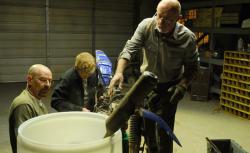Emily’s analogy between Walt’s empire building and Napoleon makes me want to defend the Frenchman. Say what you will about the tenets of Bonapartism, but at least it’s an ethos. Wherever his armies marched, Napoleon brought an end to feudal privileges and introduced the metric system, an updated code of laws, Jewish emancipation, and other benefits of Enlightenment rationalism. Whether that all made the bloodshed worthwhile is questionable at best (and beyond the scope of this humble TV Club), but you can see why people would have marched alongside him into Russia. Where I think we all agree is that what Walt lacks at this point is a story he can tell his wife or his co-workers or the audience about what he’s trying to do that makes some kind of sense.
I particularly concur that it’s hard to see Walt as building this empire for his kids. But my read is that this is a very real change over time. I think Walt got into this game out of a sincere concern for his family and their well-being. That concern was linked, from the very beginning, to a sort of macho focus on his self-image as manly provider, but it’s only fairly recently that his ego has run completely amok. And in a way, for me it’s only with this episode’s revelation of the $5 million exit strategy that the “doing it for the family” theory becomes completely untenable. That’s a lot of money! More than enough to live comfortably, to afford whatever treatments he may need for his cancer, and to set his kids up very nicely whether he lives or dies.
Turning that down in exchange for a much riskier alternative that stands a much higher chance of leaving his kids with nothing, of permanently costing him his relationship with his children, or even of getting the kids killed was—to me—a really striking turn. At previous points, I feel like the writers have always made sure that Walt didn’t have a really appealing out. Then they gave him one, and he slaps it away.
The dinner scene is growing on me now that I’ve had time to reconsider. I first watched it primarily as a scene about Walt and Skyler. But viewed as a scene about Jesse, it reminds me of something important about his character: Jesse’s a nice kid from a good middle-class family. He knows how to be a polite guest at someone’s house. His problem has always been that he’s a meth addict. But to be an effective partner in a major meth distribution ring, he needs to be clean and functional. And that’s what we’ve seen this season—an increasingly able Jesse playing a much larger, substantive role in outlining strategy for the operation. But the thing is: Functional, nonaddict Jesse has no need for this. Instead of spending his time plotting train robberies, he should be thinking up a scheme to reconcile with his parents.
So thank God for June riding to the rescue with a suggestion—the gang needs to stay in business to stop Declan from monopolizing the market! Not only will his dreams of getting the blue meth off the market saddle addicts with an inferior product, but just think of the price gouging. Given meth’s addictive nature, you can expect a low price elasticity of demand. But competition still puts a ceiling on prices. With Walt out of business, Declan will be able to gouge with impunity. Conventional wisdom would have you believe that a meth kingpin like Walt is partially to blame for meth addicts’ misery, but simple economics tells us that him leaving the business would only make things worse. He has an obligation to the junkies of the American Southwest to keep on cooking.
Buying it? OK, me neither. But I’m really eager to hear what Walt’s new scheme is! As I said, I’m a sucker for a good cliffhanger.
Might as well get this over with,
Matt
